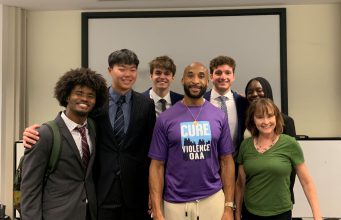A significant marker of a leading business school is the creation of new knowledge. Goizueta faculty, using rigorous methodologies, focus on researching important problems that affect the practice of business. The following is a sampler of recently created new knowledge.
Reducing home equity bias through transparency
One of the goals of global stock exchange mergers is to create a consolidated trading platform that makes listed firms available to a greater number of investors while providing firms with larger pools of liquidity. But the problem of equity home bias—the tendency of investors to overinvest in domestic securities and underinvest in foreign securities—can thwart optimal global portfolio diversification. In a recent study, Grace Pownall, professor of accounting; Maria Vulcheva 05MBA 11PhD (FIU); and Xue Wang (Ohio State) examine such home bias in Euronext, which was created in 2002 when four European countries merged their stock exchanges. The researchers focus in particular on two structural mechanisms adopted by Euronext: (1) the integration of trading platforms across the four exchanges, and (2) the creation of named segments open to firms that voluntarily pre commit to greater transparency in financial reporting and corporate governance. In their investigation of these mechanisms, the researchers find that firms that choose not to join the segmented list see no diminution of home bias, while the segmented, more transparent firms reap significant increases in all categories of foreign holdings relative to domestic holdings. Management Science (forthcoming).
The challenge of accurately weighting contrary advice
Auditors regularly seek informal advice about their initial judgments from other auditors. Audit firms encourage this advice seeking, believing it enhances professional skepticism and improves professional judgment. But does it? A recent study by Kathryn Kadous, professor of accounting; Justin Leiby (U. Florida); and Mark Peecher (U. Illinois at Urbana-Champaign) investigates contrasting theories and evidence on whether seeking advice improves auditors’ judgment and on the factors that influence how readily they incorporate contrary advice into their judgments. They find that nonspecialist auditors who seek advice from those with whom they share a close social bond tend to overestimate the value of that advice. On the other hand, specialists tend to underestimate such advice, perhaps, note the authors, because of threats to the specialists’ egos. In both cases the defensibility of the auditors’ conclusions is negatively affected, heightening audit risk. The Accounting Review (2013).
Going about business . . . and helping change
Politically oriented organizations, such as those advocating equal rights for lesbians and gays, have long been credited with effecting changes in public policy that reduce discrimination. But what about the role of “ordinary” commercial organizations, such as dry cleaners or insurance agencies or clothing stores, that are affiliated with a “challenger” group that has limited recognition in a political system? A recent article by Giacomo Negro, associate professor of organization and management; Glenn Carroll (Stanford); and Fabrizio Perretti (Bocconi) examines such organizations, which are often overlooked in the study of policy outcomes. The researchers find that “politically mundane” commercial enterprises linked to lesbians and gays can contribute distinctly to local enactment of nondiscriminatory policies. The researchers attribute this to the bridges created between these businesses and the larger community, and to the normalcy and legitimacy signaled by their familiar organizational forms. They find that the more diverse in nature these commercial organizations are, the greater their potential to bring about nondiscriminatory policies. But this potential is diminished, they note, in communities where political organizations, particularly those engaging in contentious action, have a larger presence. The authors conclude that commercial organizations are an important complement to political action and can helpfully challenge discrimination while enhancing community connections and awareness. American Journal of Sociology (2013).
Corporate governance and CEO turnover
Deciding to retain or fire a chief executive officer (CEO) can be one of the most difficult and consequential decisions a corporate board makes. Using data on the CEO dismissals of large US corporations from 1994 to 2007, Raymond Fisman (Columbia), Rakesh Khurana (Harvard), Matthew Rhodes- Kropf (Harvard), and Soojin Yim, assistant professor of finance, investigate how corporate governance—and in particular, shareholders’ ability to influence the board—affects firm performance. Conventional wisdom suggests that limiting shareholder influence protects inferior CEOs from dismissal. In contrast, the researchers construct a model, supported by evidence, showing that insulating the board from biased or uninformed shareholders can improve the quality of a board’s firing decision. Management Science (2014).
Forecasting sales using financial stock market data
Firms use many kinds of data for forecasting future sales—one of the key activities in the management of a business—and combine various methods in order to utilize different types of information. A recent study by Nikolay Osadchiy, assistant professor of information systems and operations management; Vishal Gaur (Cornell); and Sridhar Seshadri (UT Austin) focuses on financial stock market data in developing a new methodology for firm-level sales forecasting, testing it against standard benchmarks such as forecasts from equity analysts and time-series methods. Applying their method to the forecast of total annual sales for US public retail firms, the researchers find their market-based approach achieves an average 15 percent reduction in forecasting error compared with more typical forecasting methods. Their model, they write, can also be applied to hedging operational risk with financial instruments. Production and Operations Management (2013).
System dynamics understanding enhances project management
Projects exhibit the quintessential characteristics most often discussed in system dynamics: a tendency to evolve over time as a result of inputs, feedback, and shifts in data, resources, and connections, writes Elliot Bendoly, associate professor of information systems & operations management and Caldwell Research Fellow. Yet empirical evidence on the many ways in which systems thinking can impact internal project dynamics and performance has remained limited. Focusing on one aspect of systems thinking— an individual’s ability to recognize and understand system dynamics—Bendoly addresses this shortfall of evidence though a study drawing on a unique, large-scale interview data set along with survey data drawn from multiple sources. He finds that when an individual exhibits an understanding of system dynamics, and especially when team members share that understanding, perceptions of psychological safety are enhanced, as is the quality of information sharing in project work and overall performance. Production and Operations Management (forthcoming)
Tournament strategies: Collusion or competition?
As many as one-third of US corporations make use of tournament incentive schemes, where compensation is linked to employees’ performance and ranking. But how does the degree of mutual monitoring— the ability of employees to observe each other’s productive activities—affect effort? In a study on mutual monitoring and rank-order tournaments, Lynn Hannan (Tulane); Kristy Towry, Goizueta Term Chair and associate professor of accounting; and Yue (May) Zhang (Northeastern) conduct two experiments to determine whether employees are more likely to collude, resulting in lower effort, or to compete, resulting in higher effort, when they are able to monitor each other during a tournament. They find that mutual monitoring can actually work in either direction, and that it depends on the workplace culture. For example, when management practices are perceived to be unfair, this creates a general inclination for workers to collude against management. In this case, mutual monitoring will amplify the collusion, resulting in lower effort. Likewise, when the workplace culture encourages competition, mutual monitoring contribute to higher effort. Contemporary Accounting Research (2013).
Focus on extreme polluters
In recent years, several scholars have recommended that countries reduce their energy-related CO2 emissions by setting carbon intensity targets for their electricity generating plants. Other research suggests that countries could substantially cut their emissions simply by focusing on lowering the carbon emissions of the most extreme polluters. Using a unique international data source on power plants, researchers Don Grant (U. Colorado); Wesley Longhofer, assistant professor of organization and management; and Andrew Jorgenson (U. Utah) inform this issue by analyzing the distribution of CO2 emissions and intensities within the electricity sectors of 20 countries. They find that the dirtiest 5 percent of power plants are responsible for huge shares of their sectors’ total emissions, noting that “if these plants continued generating the same amount of electricity but met particular intensity targets, the world’s total electricity-based CO2 emissions could be reduced by as much as 44 percent.” Journal of Environmental Studies and Sciences (2013).











